Tokyo Sonata
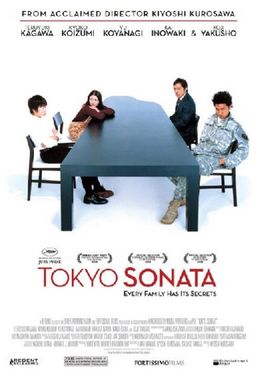
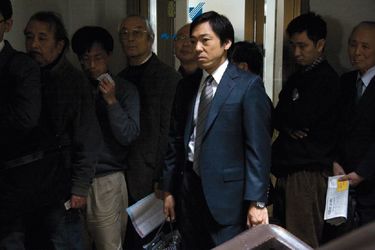 The film kicks off with an office administrator named Ryuhei (Teruyuki Kagawa) being fired when his company is forced to downsize and seek outsourcing help from China. He's always been the main supporter and provider of his family, so he has no idea how to tell his trusting wife Megumi (Kyoko Koizumi) when he comes home that night. (He even tries to sneak inside the house without her knowing.) Each day, he dresses up in his business clothes, and pretends to go off to work, as he desperately searches various employment companies, only to discover that not only are there not many administrative jobs available anymore, but that he's a relic of the past, and unable to fill the needs of most employers. His two sons, 18-year-old Takashi (Yu Kyoanagi) and youngest son Kenji (Kai Inowaki) have problems of their own in parallel subplots. Takashi wishes to join to military and aid the US in the war overseas, while Kenji is secretly using the monthly lunch money his mother gives him for piano lessons, which his father has forbidden for financial reasons.
The film kicks off with an office administrator named Ryuhei (Teruyuki Kagawa) being fired when his company is forced to downsize and seek outsourcing help from China. He's always been the main supporter and provider of his family, so he has no idea how to tell his trusting wife Megumi (Kyoko Koizumi) when he comes home that night. (He even tries to sneak inside the house without her knowing.) Each day, he dresses up in his business clothes, and pretends to go off to work, as he desperately searches various employment companies, only to discover that not only are there not many administrative jobs available anymore, but that he's a relic of the past, and unable to fill the needs of most employers. His two sons, 18-year-old Takashi (Yu Kyoanagi) and youngest son Kenji (Kai Inowaki) have problems of their own in parallel subplots. Takashi wishes to join to military and aid the US in the war overseas, while Kenji is secretly using the monthly lunch money his mother gives him for piano lessons, which his father has forbidden for financial reasons. Tokyo Sonata deals with the struggles the family faces as they are drawn deeper into their individual secrets. Ryuhei's depression over losing his job and fear of having his secret found out takes its toll on him to the point that he becomes physically violent with his youngest son when he finds out about the secret piano lessons. He is angry over his son keeping the secret from him, not even noticing the irony of the situation. Ryuhei is the central focus of the film itself, so he becomes the character we most identify with. We feel his pain throughout as he tries to lead a normal life, while slowly realizing that things will most likely never be the same. Early in his job hunt, he comes across a former friend from high school who is also looking for work, and has gone to great lengths to trick his family into thinking everything's the same. (He's set up his cell phone to go off every couple minutes, so people will think he's taking business calls on it.) The movie is quiet, and never plays up the melodrama of the situation. It also expertly jumps back and forth between each family member and their individual storyline.
Tokyo Sonata deals with the struggles the family faces as they are drawn deeper into their individual secrets. Ryuhei's depression over losing his job and fear of having his secret found out takes its toll on him to the point that he becomes physically violent with his youngest son when he finds out about the secret piano lessons. He is angry over his son keeping the secret from him, not even noticing the irony of the situation. Ryuhei is the central focus of the film itself, so he becomes the character we most identify with. We feel his pain throughout as he tries to lead a normal life, while slowly realizing that things will most likely never be the same. Early in his job hunt, he comes across a former friend from high school who is also looking for work, and has gone to great lengths to trick his family into thinking everything's the same. (He's set up his cell phone to go off every couple minutes, so people will think he's taking business calls on it.) The movie is quiet, and never plays up the melodrama of the situation. It also expertly jumps back and forth between each family member and their individual storyline.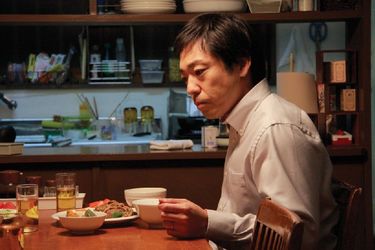 And that's what makes the movie so involving to watch. For a majority of the film, Kurosawa tells the story in such a subtle way that we feel like we are watching real life up on the screen. Each of the parallel storylines are given proper time to evolve, so that we become attached to the individual members. Of special note is Kyoko Koizumi, who gives a very heartfelt and honest portrayal of the housewife and mother trying to hold the family together even when everything is flying apart around her. It's very fitting that the very first image we see in the movie is of an open door in the family's house as a storm begins to rage outside, blowing water into the home. The wife enters the frame, and quickly shuts the door, locking the storm out. As the film goes on, her house is invaded by a different kind of storm, one she cannot block out, and she doesn't know how to handle it. The two sons also grow on us through their plots, although I did feel Takashi's storyline was the weakest, only because the character is not present as much as the others.
And that's what makes the movie so involving to watch. For a majority of the film, Kurosawa tells the story in such a subtle way that we feel like we are watching real life up on the screen. Each of the parallel storylines are given proper time to evolve, so that we become attached to the individual members. Of special note is Kyoko Koizumi, who gives a very heartfelt and honest portrayal of the housewife and mother trying to hold the family together even when everything is flying apart around her. It's very fitting that the very first image we see in the movie is of an open door in the family's house as a storm begins to rage outside, blowing water into the home. The wife enters the frame, and quickly shuts the door, locking the storm out. As the film goes on, her house is invaded by a different kind of storm, one she cannot block out, and she doesn't know how to handle it. The two sons also grow on us through their plots, although I did feel Takashi's storyline was the weakest, only because the character is not present as much as the others.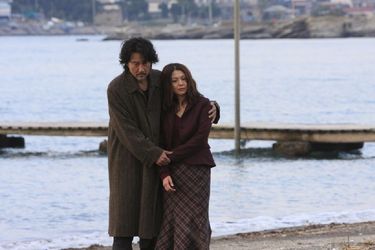 That's why it's unfortunate that the film decides to sell itself short in the final half. What had been an extremely subtle and simply effective family drama turns somewhat broad and almost comical when an incompetent burglar breaks into the house, and takes the mother hostage. From that point on, the movie almost starts to betray itself. These characters that we've become so attached to become contrivances in a series of coincidences and lazy plotting that just doesn't match what had come before it. It's maddening to watch, though it fortunately restrains itself from going so far off the rails that we stop caring. It simply turns what could have been a great movie, one of the best of the year, into a very good movie. At least we never stop caring about the characters, and the film's conclusion returns to the successfully quiet atmosphere.
That's why it's unfortunate that the film decides to sell itself short in the final half. What had been an extremely subtle and simply effective family drama turns somewhat broad and almost comical when an incompetent burglar breaks into the house, and takes the mother hostage. From that point on, the movie almost starts to betray itself. These characters that we've become so attached to become contrivances in a series of coincidences and lazy plotting that just doesn't match what had come before it. It's maddening to watch, though it fortunately restrains itself from going so far off the rails that we stop caring. It simply turns what could have been a great movie, one of the best of the year, into a very good movie. At least we never stop caring about the characters, and the film's conclusion returns to the successfully quiet atmosphere.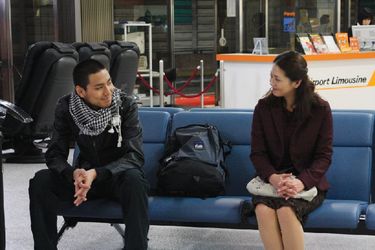
See the movie times in your area or buy the DVD at Amazon.com!






0 Comments:
Post a Comment
<< Home